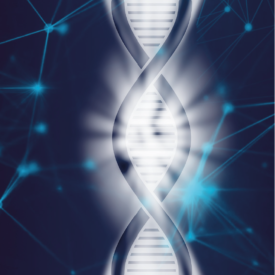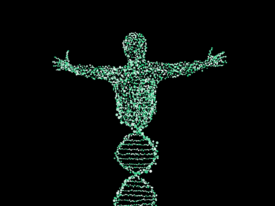How Do Kefirs Influence the Gut-Brain Axis?
Kefir, a traditional fermented food, originates from Caucasus mountains. Kefir is easily created by mixing milk with kefir grains. These are live microorganisms (bacteria and yeasts) that start the fermentation process. Depending on the composition of the kefir grains, you can create many different kefirs. The word kefir is derived from the Turkish word Keyif, which means “good feeling”. Indeed, researchers have found that kefir drinks are related to numerous health benefits, including immunity modulation, cholesterol metabolism, and tumor suppression [1]. Furthermore, kefirs may ameliorate certain psychological issues by modifying the composition of your gut microbiome. Research has shown that...
The Importance of Physical Activity During Lockdown
In the past months, many of us have had to stay home, work from home, and organize social events online, from home. This has led to a great reduction in physical activity, which has negative effects on both our physical and mental health. Moving less can result in gaining weight, and this is especially worrying for people who already have obesity. What’s worse, having obesity is a risk factor for being hospitalized after an infection of the SARS-CoV-2 virus, which causes the COVID-19 pandemic. It is therefore important that people keep exercising, in addition to following a healthy diet, in...
The Benefits of Breastfeeding
Globally, between 2013 and 2018, 43% of newborns were breastfed within one hour after birth, and 41% were exclusively breastfed up until six months of age (WHO & UNICEF, 2019). The World Health Organization recommends exclusive breastfeeding for the first 6 months of life, and continued breastfeeding with appropriate complementary foods for up to 2 years and beyond. Why is that? After birth, breast milk is often the first source of nutrition for an infant. Mother’s milk is fine-tuned to the needs of the developing infant. As such, breastfeeding plays an important role in early development and health. First, breastfeeding...
Treating Food Intolerance and Allergies with the Elimination Diet
Food intolerances and allergies are a growing public health concern. In fact, it is estimated that between 2-20% of the people worldwide may suffer from food intolerances (2) and may be even more prevalent in Western countries, where food allergies affect up to 10 % of the population, especially younger children (3). If you ever experienced discomfort after ingestion of some foods, you may have come across the term ‘elimination diet’. But what is it and how could this be relevant for you? The elimination dietElimination diet describes a short-term diet that is used as a diagnostic or therapeutic instrument...
How we measure behavior outside of the laboratory
Imagine that you are a researcher who wants to know if daily physical activity training can improve mood and mental health in individuals with ADHD. Ideally – from a research perspective – you would keep these individuals at your laboratory for a couple weeks, monitor everything they do, and ask them repeatedly how they feel. This setting is very controlled, and you are sure that your participants will do the exercise exactly as they are supposed to do. However, spending weeks in a laboratory would be very unpleasant for the research participants, and very unfeasible. The alternative is to make...
ADHD medication during pregnancy
For women who use medication, being pregnant can raise a lot of questions and concerns. “Should I discontinue stimulants when I am pregnant?” “Is it harmful to my developing baby if I take ADHD medications during my pregnancy?” “What are the risks both to me and my baby if my ADHD goes untreated?” “What is the best way to manage my ADHD during pregnancy?”. We recently investigated all currently published evidence about the safety of ADHD medication use while pregnant. Based on this information, we concluded that using ADHD medication during pregnancy does not seem to have any serious consequences...
The few-foods diet for the treatment of ADHD: yay or nay?
The Few-Foods Diet approach It has been suggested that for a subgroup of children and adolescents with ADHD, symptoms may be the result of hypersensitivity to certain foods (Pelsser et al. 2009). To define whether or not food is a trigger for ADHD, children can undergo an individualised few-foods diet procedure (also often called and ‘elimination diet‘). The procedure starts with a highly restrictive phase, in which the child eats only very few foods. If the child responds well (i.e., if ADHD symptoms subside or even disappear), foods are re-introduced one by one to find which foods are causing the...
Morning larks, night owls and mental health
Are you a morning or an evening person? Your chronotype is linked to your preference of when you go to sleep and when you are most productive during the day. “Larks” are generally 2-3 hours ahead, they feel and function better during the first half of the day and go to bed rather early. “Owls” prefer to work in the evenings and tend to go to bed and wake up later. The third chronotype is the in-between, balanced version of these two. Your chronotype is linked to your circadian rhythm which is your inner clock that regulates your sleep/wake cycle...
How the FTO gene increases the risk of obesity
Did you know that in year 2015 more than 100 million children and 600 million adults had obesity? In fact, the prevalence of obesity has almost doubled since 1980 and it doesn’t seem to be slowing down (1). Factors like genetics, biology, individual behaviors such as diet and physical activity, and other influences from an individual’s environment and lifestyle, play a role in the development of obesity (2). Developments in the field of genetics have given us the opportunity to search through an individual’s whole genetic material (called the genome) for small genetic variations that occur more frequently in people...
Some genes make us vulnerable to more than one psychiatric condition
The burden of chronic diseases on patients and society has overtaken the burden of infectious diseases, and psychiatric disorders are among the top ones, contributing to 23% of those years lived with disability over the lifespan. To make it even worse, mental conditions do not usually come alone, but they tend to co-occur in patients, and this greatly reduces life expectancy. But what is the reason for that? Certain behavioral traits or psychiatric conditions may facilitate the advent of other pathologies (for example, the impulsivity that is a characteristic of ADHD is a risk factor for substance use disorders), or...









